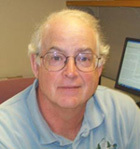
While other folks might be content to resign their retirement years to blazing Floridian sunsets or skill development on the putting greens of Arizona, Robert Flood is bringing a lifetime of real world experience at the International Monetary Fund (IMF) to the Department of Economics and Econometrics.
Flood, who joined the faculty this fall as a professor, is an empirical macroeconomist whose research interests focus on international capital markets, the causes and effects of exchange rate crises and speculative bubbles in financial markets, and financial integration. The 22-year IMF veteran served as a senior economist and editor of IMF Staff Papers. Over his career, he has also had several faculty assignments at the University of Virginia and Northwestern University.
“As a former president once said: ‘This is not my first rodeo,’” Flood quips about his return to the classroom.
He has spent his career dissecting economies in extreme circumstances and is perhaps best known for his groundbreaking work on speculative currency attacks. In fact, his formula for modeling such attacks, developed with Brown University’s Peter Garber and associated with the independent research of Princeton University’s Paul Krugman, a Nobel Laureate and New York Times columnist, has become canonical for making sense of—and perhaps anticipating—destabilizing currency events.
Richard Jensen, chair of economics and econometrics, terms Flood’s appointment a “real coup” for the department.
“He brings both an academic understanding of and practical experience with financial crises and international development, as well as an international reputation as a scholar and practitioner,” Jensen says.
“His research has had a substantial impact in economics, as measured by his record of publications—more than 60 articles in refereed journals and the more than 3,000 citations to his research, which places him in the top five percent of best-cited economists.”
Glad to have the opportunity to “present the real history” of past notorious crises to Notre Dame economics students, Flood is determined that they emerge with a clearer understanding of what actually constitutes an economic bubble. From Dutch Tulip Mania to the South Sea Bubble, too much sloppy history-writing, he says, has mislabeled many scenarios that could easily be accounted for by market fundamentals.
“The popular writing on so-called bubbles is usually all wrong, all garbage,” Flood says. "I don’t mind when the journalists get it wrong; they’re not supposed to do deep research. Their job is to sell newspapers, and they’re just doing their jobs. It bothers me when the people who should know better get it wrong, though.
“This happens constantly. Some journalists declare something a bubble and then an economist turns around and cites them.”
He reserves the term for speculative rushes and collapses that follow the “greater fool” investing strategy or which otherwise cannot be explained rationally. Even our current so-called housing bubble, he says, can probably be explained by a vigorous review of the market realities that produced it.
“You know, not everything works out. A lot of people can make investments having looked at the fundamentals as best they could and still wind up losing out in a market collapse. This happens all the time; it doesn’t mean it’s a bubble.”
Flood is popping such presumed bubbles in two classes this fall, teaching an undergraduate course on speculative price bubbles and financial crises and a graduate seminar reviewing topics of international economics and finance.


